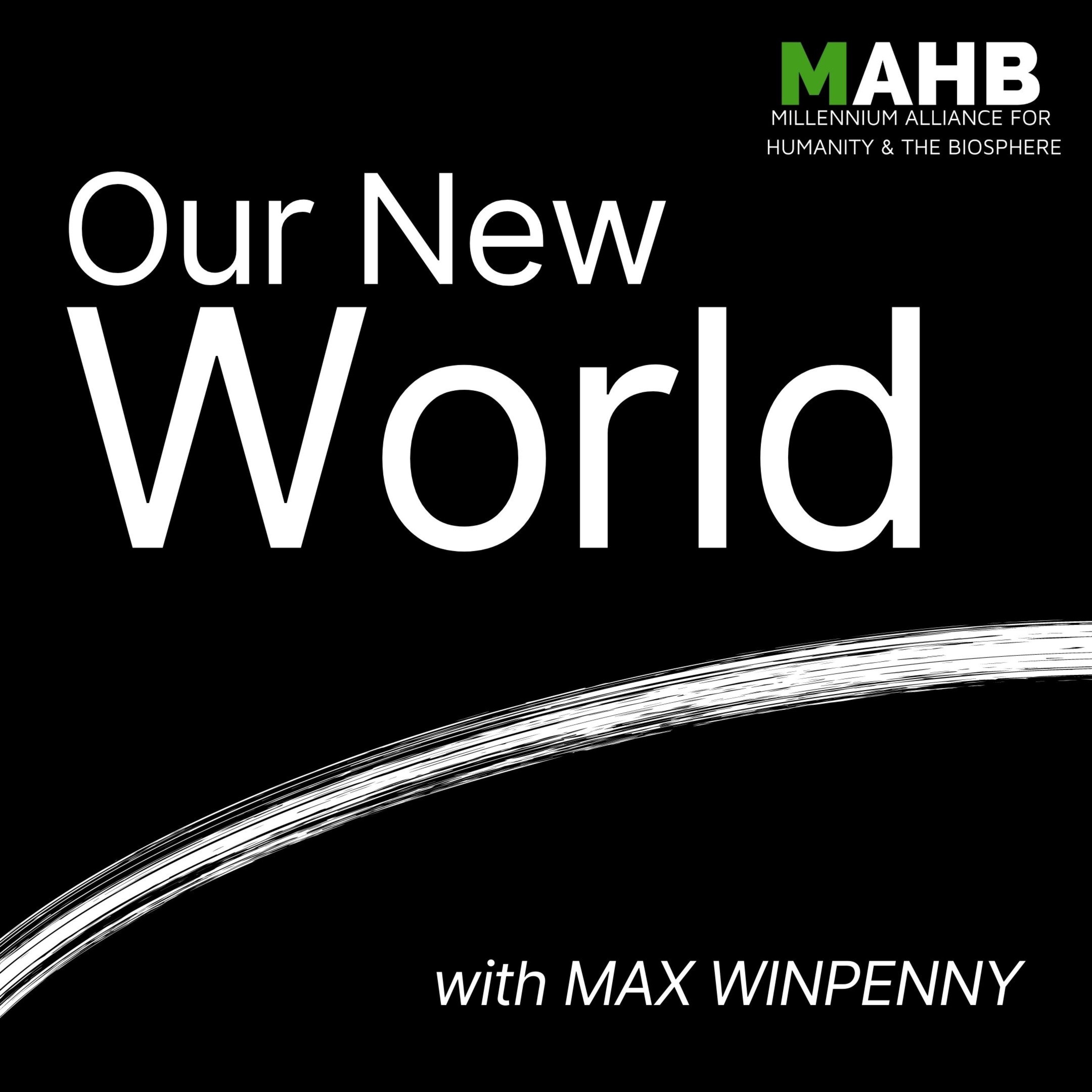
3.6K
Downloads
24
Episodes
What can we do to make our world a better place? Join us for intimate conversations exploring pioneering ideas and solutions-focused thinking about the most significant topics of our generation. In a time saturated with information but not as many solutions, listen to advice from great minds and thought leaders about what we can do to make our new world a better place.
Episodes
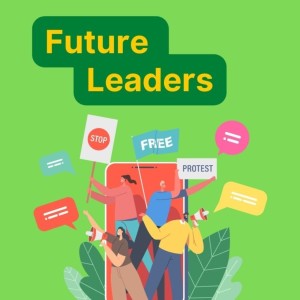
Monday Aug 01, 2022
Future Leaders - Season 2 Trailer
Monday Aug 01, 2022
Monday Aug 01, 2022
"Change is coming, whether you like it or not"
- Greta
Season 2 of Our New World is all about future leaders. Don't miss it, every other Wednesday on your podcasting platform of choice.
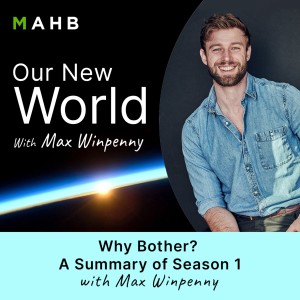
Sunday Jan 23, 2022
Why Bother? A Summary of Season 1 - with Max Winpenny
Sunday Jan 23, 2022
Sunday Jan 23, 2022
We’ve come to the end of season 1 of Our New World! Thank you all for listening - It’s meant a lot, and It’s been a great experience doing this podcast, and one that I’m going to continue with the input and help of all of you lot.
So, if we go back and remember that this series is all about women in the world, this episode is going to be clips from all the messages that these brilliant women shared about how we can move the dial environmentally and socially to make our world a better place. First though, I want to talk a little about the point of this podcast again.
So, I am by no means a perfect environmentalist. I struggle to eat vegan consistently, I still waste, and I even find recycling a little confusing. And that’s all after a Master’s degree in environmental science! So I’m aware how preachy some of this information could sound and how it’s actually quite easy to shy away from ‘environmentalism. My intention is not to try and guilt people into acting environmentally, my intention is actually to do the opposite.
I think that if we can see all of the positives that come from being connected to nature, it’s going to be more persuasive than seeing adverts with dying polar bears and forest fires left, right and centre. Don’t get me wrong, I think that we need to see those things, I think that we do need to be surrounded by those things, because glossing over the truth is not the answer and those things are happening. That being said, everyday people have lots of things going on. We have lives to live and we have largely been given this unsustainable template by which to live our lives. And trying to change that is really hard, and that’s important to recognize. It just takes a new years resolutions lists and a wasted gym membership to know that changing habits is difficult. No one is a bad person because they put a compostable coffee cup in the recycling. Most of us are just doing our best.
So the point of this is not only to help educate us and myself at the same time, because I certainly learnt a lot, but also to help us understand that we can live happily and prosperously, by being more connected with one another and more connected with the natural world. Ultimately, we have to change behaviors, but that doesn’t mean making huge sacrifices, and the sacrifices that are made bring benefits in other ways, which is a message that is gloriously conveyed by these people that I was lucky enough to talk to this season.
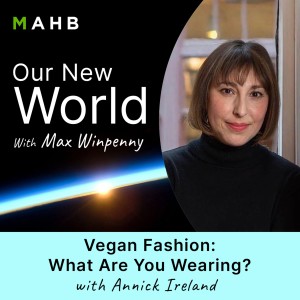
Sunday Dec 19, 2021
Vegan Fashion: What Are You Wearing - with Annick Ireland
Sunday Dec 19, 2021
Sunday Dec 19, 2021
“The truth is that when you look at sustainability it can mean so many different things it’s a continuum.”
Becoming vegan seems to be the decision that plagues the mind of a lot of us. We keep getting told that eating meat is one of the biggest contributors to climate change, but there is still so much of it on the shelves, and a lot of us have grown up with meat being the staple ingredient of our diet. It’s hard to make that shift.
Eating meat is one thing, but as this conversation will hopefully shed some light on, there are other ways to start bringing veganism into our lives. Namely, with what we wear. The fashion industry is another major contributor to climate change that needs a bit of a revolution, we have already talked about fashion on this podcast, and Annick Ireland is another leader who’s making waves in the industry. She is the CEO and Founder of the organization, Immaculate Vegan (immaculatevegan.com), which searches for the most sustainable, vegan fashion and homeware. Like with vegan food becoming more and more available, Immaculate Vegan is making vegan fashion more accessible to everyday people, including someone like myself who likes fashion but doesn’t know much about it! It ranges from high class sustainable brands to everyday wear.
Annick is another example of someone who decided to apply their skills to align more with her own values, and created a brand that that’s now having a massive impact. You can’t help but feel that the more people who make this sort of shift, the more likely it is that we’ll start seeing the positive impacts on our planet.
Annick Ireland became vegan in 2016 after adopting a greyhound from the Retired Greyhound Trust and making the connection between the pets we love and all other animals. Wanting to also wear her values, she searched far and wide for stylish, high quality vegan fashion that was sustainable too – and struggled!
However, after many hours, days and months spent on the internet and Instagram, she discovered that a wealth of beautiful vegan fashion brands were out there, but they were hard to find. So with a background in marketing and business, she realised she could combine her passions by bringing together the best and most beautiful vegan products in the world, and make it easy for others to discover and buy them.
Annick lives with her partner in North London and, when not hunting out wonderful items from every corner of the globe, she spends her time reading historical crime fiction, going for long countryside walks, wild swimming, and drinking Pinot Noir with friends.
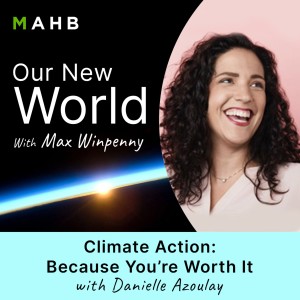
Tuesday Nov 09, 2021
Climate Action - Because You‘re Worth It - With Danielle Azoulay of L‘Oreal
Tuesday Nov 09, 2021
Tuesday Nov 09, 2021
“That’s what sustainability is about; It’s a commitment to continuous improvement.”
Do you ever feel completely frustrated that nothing is happening about our environmental crisis? Well, Danielle Azoulay did, and she did something about it. A common feature that I hear about people’s work is that they feel like they aren’t making as big a difference as they would like. This story tells us is that with some drive and passion, making a difference is more within our control than it perhaps feels. As a citizen, and an employee of Calvin Klein Jeans, Danielle felt that there wasn’t enough being done for the environment. Starting with simple conversations with her colleagues, she was able to develop some traction with environmental programs at work. She went on to establish the sustainability program at Marc Jacobs International, and is now head of Corporate Responsibility for L’Oréal USA, the biggest beauty company in the world.
This is an episode for everyone who is involved with, or wants to be more involved with sustainability at work. But particularly for you swanky corporate folk living it large in the private sector. Especially I you are involved in CSR! An interesting part of this discussion was about how much impact the private sector can have, partly because there is such a competitive drive in the private sectors, that when companies put their minds to something, they go all in. This is particularly interesting as we are in the midst of COP26, in Glasgow, which will hopefully set some pretty ambitious sustainability goals which markets will need to respond to quickly. While letting markets lead us hasn’t always been the most wonderful thing for us, seeing the market race towards being the first over the carbon neutral line could be a beautiful thing to watch.
We also go on to talk about the need for positive talk around climate change. There is so much ‘doomsday this’ and ‘Armageddon that’ when it comes to environmental talk that it’s easy for people to feel disengaged. Obviously, we need the facts, we need the truth, we shouldn’t gloss over the fact that we are in more than a pickle when it comes to climate change. BUT, and this is a big but, there is such as thing as empathy overload in humans. We can only take in so much before we feel helpless to the situation. It is important to talk about the success stories of climate change and celebrating the wins, no matter how small.
Finally, Danielle gives us her priorities for how we can get involved in climate action. SPOILER ALERT, one of her big ones is to get out there and VOTE. She is a reminder that we can take more responsibility for this situation than we are made to feel is possible.
Danielle Azoulay is the head of Corporate Responsibility for L’Oréal USA. As part of her role, she oversees the implementation of L’Oréal’s global sustainability program L’Oréal for the Future, which addresses environmental and social impacts across L’Oréal’s value chain. Prior to joining L’Oréal USA, Danielle established the environmental sustainability program at Marc Jacobs International and worked on supply chain sustainability at PVH.
Throughout her career, Danielle has developed and executed sustainability strategies to reduce supply chain impacts, drive positive change upstream, create business value, and increase stakeholder engagement. Specifically, Danielle has designed and implemented goal-oriented programs for impact areas such as responsible chemicals management, waste management, carbon emissions, water quality, and more.
Danielle has an M.A. in Environmental Conservation and Education from New York University where she focused her studies on climate change impacts to consumer products companies. She is an Adjunct Professor at Columbia University where she teaches a Master’s level course on circular economy.
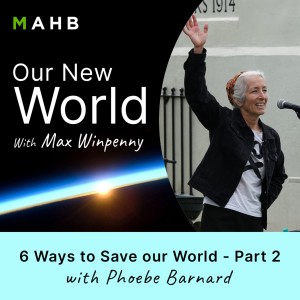
Sunday Sep 26, 2021
6 Ways to Save our World - Part 2/2
Sunday Sep 26, 2021
Sunday Sep 26, 2021
"This should be a hundreds of thousands of fires being lit across the planet".
In part 2 of episode 8, Dr. Phoebe Barnard takes us through the last 3 recommended areas of focus from her recent paper 'World Scientists’ Warning of a Climate Emergency', for which she was a co-author.
Food systems, population and the sustainable economy are on this weeks agenda, and this one also takes a dive into how increasing women's voices around climate issues can improve the way in which we are doing things, and help both women and men to become better leaders all around.
For any youngster listening, and particularly young women, Phoebe mentions some amazing resources: https://transitionnetwork.org/ | https://homewardboundprojects.com.au/vision | https://www.girlplanet.earth/
Check them out, subscribe, and share the episode to start that process of collaboration
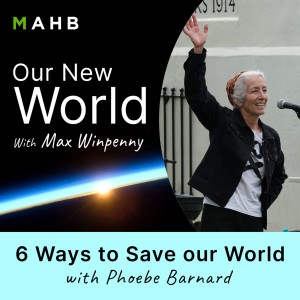
Wednesday Aug 25, 2021
6 Ways to Save our World - Part 1/2
Wednesday Aug 25, 2021
Wednesday Aug 25, 2021
In this next two-part episode, I’m having a talk with Dr. Phoebe Barnard, who has been one of the 5 core coauthors of the “World Scientists’ Warning of a Climate Emergency” paper published with nearly 14,000 scientist cosignatories in 2019 and two follow-up papers. These papers made six fundamental recommended areas for urgent action by humanity to avert the worst of the climate emergency.
She talks about what these 6 recommended areas are, and how we, as citizens, can get involved with each one. The main point of today’s episode is that normally, when scientific warnings and studies like this are released, as citizens we can feel pretty helpless and disempowered by what seems to be problems lying at the higher, systemic level, that we can’t really impact. Phoebe helps to translate these issues into solutions that we can all participate in. It’s hard to forget that without us and our actions, our policies and our economic values, there is no “system.”
The 6 recommendations focus on:
- Energy
- Pollutants
- Nature
- Food Systems
- Population
- Sustainable Economy
This episode is part 1 of 2, in which we will be discussing the first 3 recommendations mentioned, and what we can do in our everyday lives to impact them. That’s energy, pollutants and nature. Next week, part 2 will be discussing food systems, population and the sustainable economy.
Phoebe has dedicated her life to the nature, the environment and science. she is a sustainability strategist, climate change ecologist, conservation biologist, planner, policy translator, media and communications strategist and film co-producer.
Amongst other projects, she is the founding CEO of the Stable Planet Alliance, the Associate Science and Policy Communications Strategist with the Conservation Biology Institute, Affiliate Professor at the University of Washington, and Research Associate at the University of Cape Town’s African Climate and Development Initiative.
She is passionate about helping the world learn from its mistakes to become smarter, fairer and cleaner, so that we can take steps towards a new world order ‘where people and the planet actually matter’.
https://academic.oup.com/bioscience/article/70/1/8/5610806 | https://www.scientificamerican.com/article/the-climate-emergency-2020-in-review/
https://transitionnetwork.org/ | https://homewardboundprojects.com.au/vision | https://homewardboundprojects.com.au/busara-circle/ | https://www.girlplanet.earth/
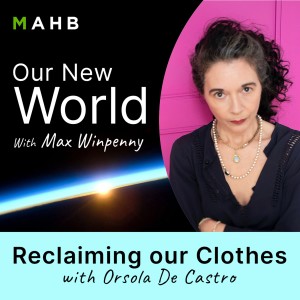
Tuesday Aug 03, 2021
Reclaiming Our Clothes with Orsola De Castro
Tuesday Aug 03, 2021
Tuesday Aug 03, 2021
Do you know where your clothes came from?
Episode 7 of 'Women in the World' has me discussing fashion with Orsola De Castro. Considering I am a socks and sandals kind of guy, I might be a little out of my depth, but she brilliantly guides me through how to be more sustainable in my fashion choices, both environmentally and socially. She talks about her recent book 'Loved Clothes Last', as well as giving us ideas about how to research our shopping choices before we buy, and how to easily get into the habit of rewearing and repairing our clothes.
Orsola is leading us into a 'Fashion Revolution', and I for one, am on board.
See the Fashion Transparency Index here: https://www.fashionrevolution.org/about/transparency/
Orsola de Castro is an internationally recognised opinion leader in sustainable fashion. Her career started as a designer with the pioneering upcycling label From Somewhere, which she launched in 1997 until 2014.
Her designer collaborations include collections for Jigsaw, Speedo, and 4 best selling capsule collections for Topshop from 2012 to 2014. In 2006, she co-founded the British Fashion Council initiative Estethica at London Fashion Week, which she curated until 2014.
In 2013, with Carry Somers, she founded Fashion Revolution, a global campaign with participation in over 90 countries around the world. Orsola is a regular key note speaker and mentor, Associate Lecturer at UAL, as well as Central Saint Martins Visiting Fellow.
Orsola’s first book “Loved Clothes Last” is published by Penguin Life, Corbaccio Editore in Italy and in France by Edition Marabou in August.
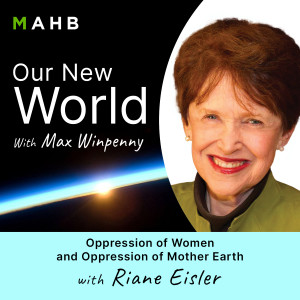
Wednesday Jul 21, 2021
Oppression of Women and Oppression of Mother Earth - With Riane Eisler
Wednesday Jul 21, 2021
Wednesday Jul 21, 2021
Why is our Society so obsessed with domination? In this episode, Riane Eisler explores the link between the oppression of women and the oppression of nature. 2020/2021 showed us that oppression is still rife in today’s world and is a major barrier to the protection of our planet.
See Riane’s work here: https://centerforpartnership.org/, https://rianeeisler.com/, https://www.partnerism.org/
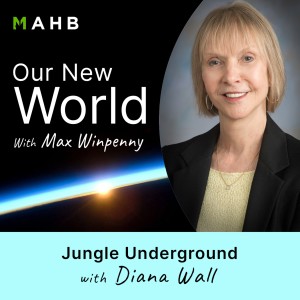
Thursday Jul 01, 2021
Jungle Underground with Diana Wall
Thursday Jul 01, 2021
Thursday Jul 01, 2021
Episode 5 is a discussion with Dr. Diana Wall. She is a distinguished professor of Colorado State University, who studies climate change, and the jungle beneath our feet; soil. Like a lot of things in this world, It is easy to forget that our lives depend on it, but the ground we walk on affects our food, water and wellbeing in a way that is practically immeasurable. Diana’s research focused on looking at nematodes, a type of remarkable, microscopic worm which can survive in the harshest conditions. They tell us a lot about how life in soil contributes to healthy soils, ecosystem services and sustainability.
Along with considering our relationship with soil, she gives an insight into what it takes to become an academic. Like business, academia is important to understand at a basic level, considering it drives and informs global policy. Our future relies heavily on new discoveries and continued research. Diana is at the front line of research, telling us about what it takes to get there.
Diana H. Wall is University Distinguished Professor and Director, School of Global Environmental Sustainability at Colorado State University. As an ecologist she is recognized for her work on soil biodiversity and climate change. She is internationally renowned for her studies of climate change impacts on soil nematode dynamics, functions, and survival in the Antarctic dry valleys. Her pioneering global scale studies of soil biodiversity are hallmarks of her career. She was president of the Society of Nematologists and the Ecological Society of America and currently is the science chair of the Global Soil Biodiversity Initiative. She has published over 200 scientific articles, co-edited 5 books and numerous chapters. She received the Tyler Prize for Environmental Achievement, the Ulysses Medal from University College Dublin, the 2019 President’s Medal from the British Ecological Society and is an elected member of the National Academy of Sciences. She earned her PhD at the University of Kentucky.
Links:
Save our soils: http://saveoursoils.com/
Nematodes(!!): https://youtu.be/ZEF1ntZJGow?list=TLGGRU1lystS_RowMTA3MjAyMQ
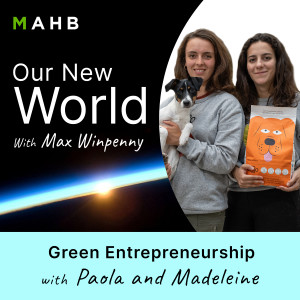
Sunday Jun 06, 2021
Green Entrepreneurship with Paola and Madeleine
Sunday Jun 06, 2021
Sunday Jun 06, 2021
Want to make money while saving the planet? No, this isn’t a get rich quick scheme; This is the idea that business and environmentalism do not have to be in opposition. We are often told about the failures of businesses and the dreaded ‘externalities’ (a cost or benefit that isn’t financially accounted for in a business e.g. pollution). That doesn’t have to be the case; we can still be ambitious in business and connect with the planet.
In this episode, entrepreneurs and lifelong friends, Paola (25) and Madeleine (26), discuss environmental entrepreneurship, the demands of creating their startup, TOMOJO, and leadership. They show us that you can fulfill serious business ambitions while making a difference for our planet. They are 21st century, France-based powerhouses who know the dedication required to start a business, but understand the importance of balance and perspective in life. It’s a refreshing take on entrepreneurship that the world desperately needs.
‘TOMOJO’, their startup, makes insect-based pet food products, and is looking to expand. Created in 2017, it’s mission is to promote natural, healthy and traceable food for pets while preserving the planet. TOMOJO sells dog and cat food elaborated with insects bred in the Netherlands. It is the story of two friends who after having completed a master's degree in environmental sciences at Imperial College London, embarked on a sustainable entrepreneurship pet food journey.
And here they are to tell us all about it.
